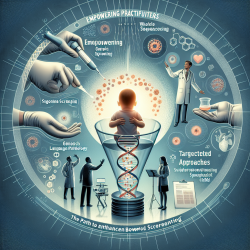Implementing Disability-Inclusive Employment Practices: Insights for Practitioners
In today's dynamic work environment, ensuring disability-inclusive employment practices is more critical than ever. The recent research article, "Disability-inclusive employment, cancer survivorship, and the Americans with Disabilities Act," provides invaluable insights that practitioners can leverage to improve their skills and foster inclusive workplaces. This blog post will explore key findings from the study and offer actionable steps for practitioners to implement these insights effectively.
Understanding the Research
The study highlights the importance of the Americans with Disabilities Act (ADA) in promoting disability-inclusive employment. It underscores two central requirements:
- Removing attitudinal and structural barriers that confront people with disabilities.
- Making reasonable adjustments to job tasks and work environments to enable equal participation.
These principles are particularly relevant in the context of cancer survivorship, where individuals may face unique challenges and discrimination in the workplace.
Key Findings
The research presents several important findings:
- Disclosure of Disability: Early disclosure of the need for accommodations during job interviews can negatively impact hiring outcomes. Timing and the mode of communication are crucial.
- Impact of COVID-19: The pandemic has intensified workplace health surveillance, potentially leading to algorithmic health discrimination. Remote work has become more prevalent, but its benefits are limited by occupational distribution.
- Cancer-Related Stigma: Cancer survivors often face stigma and discrimination, exacerbated by structural biases in the workplace and media.
Actionable Steps for Practitioners
Practitioners can take several steps to implement the insights from this research:
- Promote Inclusive Hiring Practices: Encourage employers to focus on skills and qualifications rather than disabilities. Train hiring managers on the importance of inclusive practices.
- Facilitate Safe Disclosure: Create an environment where employees feel safe disclosing their disabilities. Use video and audio communication for sensitive disclosures and separate them from salary negotiations.
- Advocate for Reasonable Accommodations: Work with employers to provide reasonable accommodations, such as flexible work hours and remote work options, especially for cancer survivors.
- Address Stigma and Discrimination: Conduct training sessions to raise awareness about cancer-related stigma and discrimination. Develop guidelines for reporting on cancer in a sensitive and informed manner.
- Leverage Data and Evidence: Use data-driven approaches to identify and implement best practices for disability-inclusive employment. Conduct regular assessments to measure the effectiveness of these practices.
Encouraging Further Research
While this study provides a solid foundation, there is a need for ongoing research to address emerging challenges and refine disability-inclusive employment practices. Practitioners are encouraged to stay informed about the latest research and incorporate new findings into their work.
To read the original research paper, please follow this link: Disability-inclusive employment, cancer survivorship, and the Americans with Disabilities Act.










